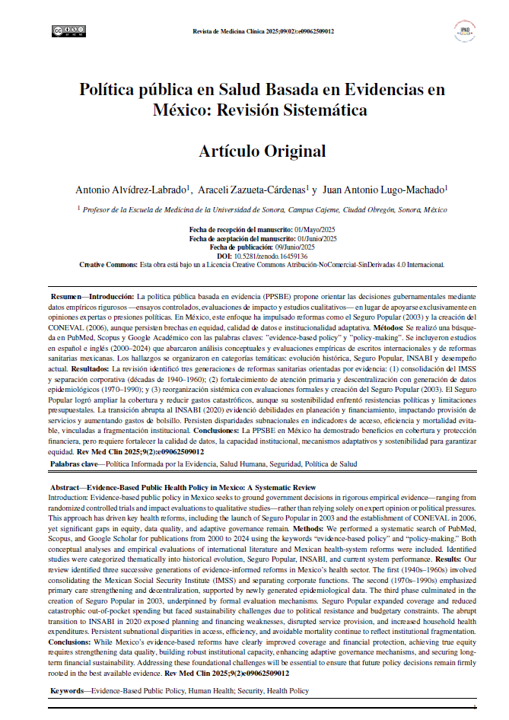Abstract
Introduction: Evidence-based public policy in Mexico seeks to ground government decisions in rigorous empirical evidence rather than relying solely on expert opinion or political pressures. Methods: We performed a systematic search of PubMed, Scopus, and Google Scholar for publications from 2000 to 2024 using the keywords “evidence-based policy” and “policy-making.” Both conceptual analyses and empirical evaluations of international literature and Mexican health-system reforms were included. Identified studies were categorized thematically into historical evolution, Seguro Popular, INSABI, and current system performance. Results: Our review identified three successive generations of evidence-informed reforms in Mexico’s health sector. The first (1940s–1960s) involved consolidating the Mexican Social Security Institute (IMSS) and separating corporate functions. The second (1970s–1990s) emphasized primary care strengthening and decentralization, supported by newly generated epidemiological data. The third phase culminated in the creation of Seguro Popular in 2003, underpinned by formal evaluation mechanisms. Seguro Popular expanded coverage and reduced catastrophic out-of-pocket spending but faced sustainability challenges due to political resistance and budgetary constraints. The abrupt transition to INSABI in 2020 exposed planning and financing weaknesses, disrupted service provision, and increased household health expenditures. Persistent subnational disparities in access, efficiency, and avoidable mortality continue to reflect institutional fragmentation. Conclusions: While Mexico’s evidence-based reforms have clearly improved coverage and financial protection, achieving true equity requires strengthening data quality, building robust institutional capacity, enhancing adaptive governance mechanisms, and securing long-term financial sustainability. Addressing these foundational challenges will be essential to ensure that future policy decisions remain firmly rooted in the best available evidence.
References
Grayson L. Using evidence: How research can inform public services: a review. Evidence and Policy. 2007;3(3).
Head BW. Reconsidering evidence-based policy: Key issues and challenges. Vol. 29, Policy and Society. 2010.
Pawson R, Tilley N. Realistic evaluation / Ray Pawson and Nick Tilley. American Journal of Evaluation. 2001;22(3).
KABOUB F. Realistic EvaluationRay Pawson and Nick Tilley, Sage, London, 1997, 256 pages. Soc Sci J. 2004;41(1).
Orenstein WA, Cairns L, Hinman A, Nkowane B, Olivé JM, Reingold AL. Measles and Rubella Global Strategic Plan 2012–2020 midterm review report: Background and summary. Vaccine. 2018;36.
Banerjee A V., Lustig N, Rogoff K. An Evaluation of World Bank Research, 1998 - 2005. SSRN Electronic Journal. 2017;
Alcaraz C, Chiquiar D, Orraca MJ, Salcedo A. The Effect of Publicly Provided Health Insurance on Academic Performance in Mexico. The Effect of Publicly Provided Health Insurance on Academic Performance in Mexico. 2012.
Frenk J, Sepúlveda J, Gómez-Dantés O, Knaul F. Evidence-based health policy: Three generations of reform in Mexico. Lancet. 2003;362(9396).
Delaney JS, Al-Kashmiri A, Drummond R, Correa JA. The effect of protective headgear on head injuries and concussions in adolescent football (soccer) players. Br J Sports Med. 2008;42(2).
Dobrow MJ, Goel V, Upshur REG. Evidence-based health policy: Context and utilisation. Soc Sci Med. 2004;58(1).
Murray C, Frenk J. World Health Report 2000: A step towards evidence-based health policy. Lancet. 2001;357(9269).
Oxman AD, Bjørndal A, Becerra-Posada F, Gibson M, Block MAG, Haines A, et al. A framework for mandatory impact evaluation to ensure well informed public policy decisions. Vol. 375, The Lancet. 2010.
Gutierrez JP, Castañeda A, Agudelo-Botero M, Martínez-Valle A, Knight M, Lozano R. Performance evaluation of Mexico’s health system at the national and subnational level, 1990–2019: an analysis of the Health Access and Quality Index. Public Health. 2024 Nov 1;236:7–14.
Knaul FM, Arreola-Ornelas H, Méndez-Carniado O, Bryson-Cahn C, Barofsky J, Maguire R, et al. Las evidencias benefician al sistema de salud: Reforma para remediar el gasto catastrófico y empobrecedor en salud en México. Salud Publica Mex. 2007;49(SUPPL. 1).
Hawkins B, Parkhurst J. The “good governance” of evidence in health policy. Evidence and Policy. 2016;12(4).
Baron J. A Brief History of Evidence-Based Policy. Annals of the American Academy of Political and Social Science. 2018;678(1).
Knaul FM, Arreola-Ornelas H, Touchton M, McDonald T, Blofield M, Avila Burgos L, et al. Setbacks in the quest for universal health coverage in Mexico: polarised politics, policy upheaval, and pandemic disruption. Vol. 402, The Lancet. 2023.
Baethge C, Goldbeck-Wood S, Mertens S. SANRA—a scale for the quality assessment of narrative review articles. Res Integr Peer Rev. 2019;4(1).
Vandenbroucke JP, Von Elm E, Altman DG, Gøtzsche PC, Mulrow CD, Pocock SJ, et al. Strengthening the Reporting of Observational Studies in Epidemiology (STROBE): Explanation and elaboration. PLoS Med. 2007;4(10).
Wells G, Shea B, O’Connell D, Peterson J. Ottawa, ON: Ottawa Hospital Research Institute. 2000. The Newcastle-Ottawa Scale (NOS) for assessing the quality of nonrandomised studies in meta-analyses.
Sturm R. Evidence-based health policy versus evidence-based medicine. Vol. 53, Psychiatric services (Washington, D.C.). 2002.
Thomson R, Murtagh M, Khaw FM. Tensions in public health policy: Patient engagement, evidence-based public health and health inequalities. Vol. 14, Quality and Safety in Health Care. 2005. p. 398–400.
Van Egmond S, Bekker M, Bal R, Van Der Grinten T. Connecting evidence and policy: Bringing researchers and policy makers together for effective evidence-based health policy in the Netherlands: A case study. Evidence and Policy. 2011;7(1).
Malterud K, Bjelland AK, Elvbakken KT. Evidence-based medicine - an appropriate tool for evidence-based health policy? A case study from Norway. Health Res Policy Syst. 2016;14(1).

This work is licensed under a Creative Commons Attribution-NonCommercial-NoDerivatives 4.0 International License.
Copyright (c) 2025 Antonio Alvídrez-Labrado, Araceli Zazueta-Cárdenas, Juan Antonio Lugo-Machado

